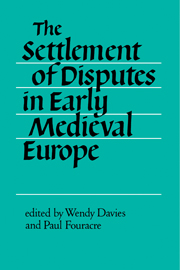Book contents
- Frontmatter
- Contents
- List of figures
- Preface
- Abbreviations
- Introduction
- 1 Disputes in late fifth- and sixth-century Gaul: some problems
- 2 ‘Placita’ and the settlement of disputes in later Merovingian Francia
- 3 Dispute settlement in Carolingian West Francia
- 4 People and places in dispute in ninth-century Brittany
- 5 Visigothic law and regional custom in disputes in early medieval Spain
- 6 Land disputes and their social framework in Lombard–Carolingian Italy, 700–900
- 7 Dispute settlement in the Byzantine provinces in the tenth century
- 8 Charters, law and the settlement of disputes in Anglo-Saxon England
- 9 Dispute settlement in medieval Ireland: a preliminary inquiry
- 10 An early modern postscript: the Sandlaw dispute, 1546
- Conclusion
- Appendix texts of the documents discussed
- Glossary
- List of works cited
- Index
2 - ‘Placita’ and the settlement of disputes in later Merovingian Francia
Published online by Cambridge University Press: 11 January 2010
- Frontmatter
- Contents
- List of figures
- Preface
- Abbreviations
- Introduction
- 1 Disputes in late fifth- and sixth-century Gaul: some problems
- 2 ‘Placita’ and the settlement of disputes in later Merovingian Francia
- 3 Dispute settlement in Carolingian West Francia
- 4 People and places in dispute in ninth-century Brittany
- 5 Visigothic law and regional custom in disputes in early medieval Spain
- 6 Land disputes and their social framework in Lombard–Carolingian Italy, 700–900
- 7 Dispute settlement in the Byzantine provinces in the tenth century
- 8 Charters, law and the settlement of disputes in Anglo-Saxon England
- 9 Dispute settlement in medieval Ireland: a preliminary inquiry
- 10 An early modern postscript: the Sandlaw dispute, 1546
- Conclusion
- Appendix texts of the documents discussed
- Glossary
- List of works cited
- Index
Summary
Narrative sources for the study of later Merovingian history are sparse and notoriously difficult to use. The evidence provided by royal charters is therefore invaluable, although traditionally they have been studied as much for their form as for their content. Here, as always, the motive force behind the production, transmission and preservation of all kinds of charters was the conservation of property, and it is the establishment or description of the property ownership in the charter which illuminates the underlying human activity. When there is a formal dispute over property the recorded process of establishing ownership becomes far more complex and may reveal to us a vivid and detailed impression of contemporary activity. In the case of later Merovingian dispute settlement the very complexity of the records suggests that they may be most revealing. On the other hand, that complexity may lie in the form of the recording document rather than in the substance of the recorded dispute. This problem, the relationship of the formal record to the reality of dispute settlement, will be a continuing theme of the present paper.
Of the eighty-seven seventh- and early eighth-century Frankish documents printed in the Monumenta series, twenty-four are the formal records of disputes settled before the king. Such disputes, and hence the documents which record them, were known as placita, and a very high proportion of the placita, over two-thirds, have survived in their original form. All of them are concerned with property and in nearly all of the cases this means landed property.
- Type
- Chapter
- Information
- The Settlement of Disputes in Early Medieval Europe , pp. 23 - 44Publisher: Cambridge University PressPrint publication year: 1986
- 19
- Cited by



